🚨 Paper now as "just accepted" at @The_JOP. We ran the first WhatsApp deactivation experiment focused on multimedia content ahead of the 2022 election in Brazil. We find a reduction in users' recall of false rumors -- and, to a smaller degree, of true news. Null effects on attitudes. Full thread ⬇️
17.07.2025 15:27 — 👍 22 🔁 4 💬 1 📌 0
In addition to the original UK results, we have now ***replicated*** this (TWICE) in the US.
The main findings hold strong: information diets are a lot more diverse in attention than in engagement.
New version here: osf.io/preprints/os...
22.07.2025 08:26 — 👍 72 🔁 17 💬 1 📌 2
University of Chicago Press Journals: Cookie absent
Congrats to the authors @tiagoventura.bsky.social, @rmajumdar.bsky.social, Jonathan Nagler, and @jatucker.bsky.social.
The paper, which is accepted for publication at @The_JOP, can be found here: www.journals.uchicago.edu/doi/epdf/10....
17.07.2025 14:51 — 👍 1 🔁 1 💬 1 📌 0
Our study was a rare field experiment on misinformation in the Global South, adding to a growing call to broaden the geographic and platform scope of causally identified misinformation research.
17.07.2025 14:51 — 👍 1 🔁 0 💬 1 📌 0
Big takeaway: WhatsApp matters—but changing exposure does not mechanically change attitudes in the short run.
Political beliefs are hard to change and probably require long-term interventions.
17.07.2025 14:51 — 👍 1 🔁 0 💬 1 📌 0
The paper also indicates:
➡️ Platforms like WhatsApp differ fundamentally from traditional feed-based platforms;
➡️ The academic community must spend time studying such platforms; and,
➡️ While difficult to study, it's crucial to explore how those in the Global Majority consume information
17.07.2025 14:51 — 👍 1 🔁 0 💬 1 📌 0
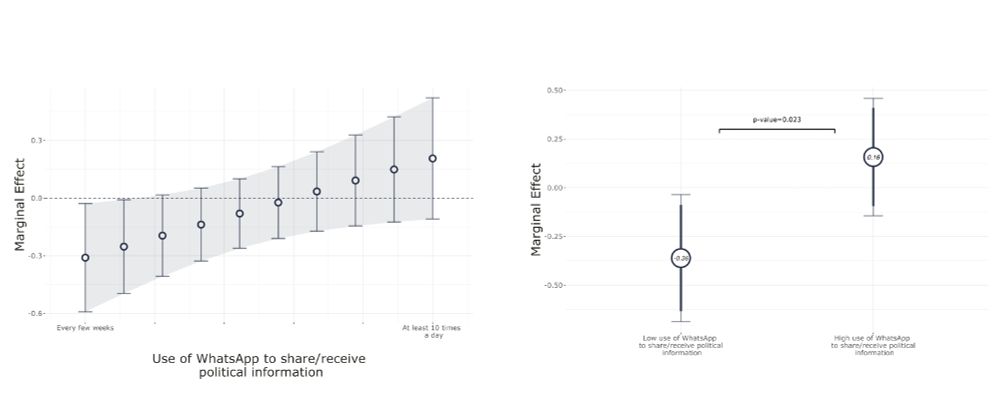
Marginal Treatment Effects of WhatsApp Multimedia Deactivation on Belief Accuracy conditional on using WhatsApp to receive and share information about politics
These findings have a key nuance: heavy WhatsApp users—those who frequently receive political content—did improve in spotting falsehoods, while others did not.
This suggests that information interventions may have unequal impacts across subgroups, depending on baseline exposure.
17.07.2025 14:51 — 👍 1 🔁 0 💬 1 📌 0
Importantly, we also found no evidence that treated users substituted WhatsApp with other platforms.
Users did not migrate to Facebook, Instagram, or Telegram, but instead, watched a bit more TV.
17.07.2025 14:51 — 👍 1 🔁 0 💬 1 📌 0
We are not the first, and unlikely to be the last, to find such mixed results.
Our findings echo recent Facebook deactivation studies & RCTs manipulating online informational spaces (e.g., re-shares, algorithmic feeds, landing pages) that show largely null effects on users’ attitudes.
17.07.2025 14:51 — 👍 1 🔁 0 💬 1 📌 0
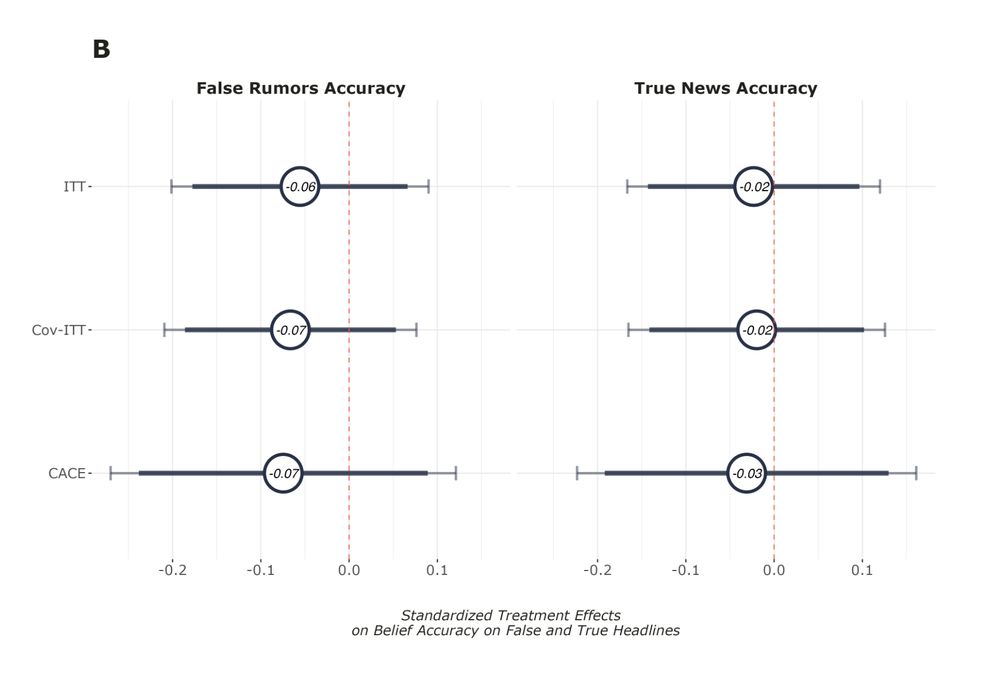
Treatment effects of WhatsApp Multimedia Deactivation on False Rumors Accuracy and True News Accuracy Judgments
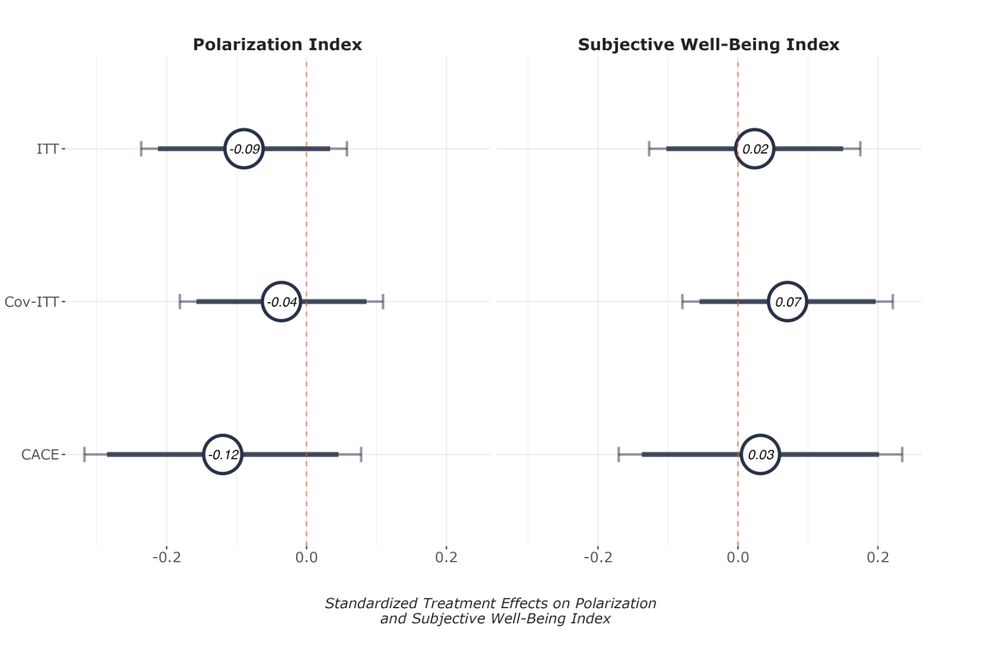
Treatment Effects of WhatsApp Multimedia Deactivation on Polarization and Subjective Well-Being
These findings are consistent with the “minimal effects” theory: the misinformation reduction did not translate to user belief accuracy and polarization changes.
Although users saw less false content, their attitudes stayed the same.
17.07.2025 14:51 — 👍 4 🔁 1 💬 1 📌 0
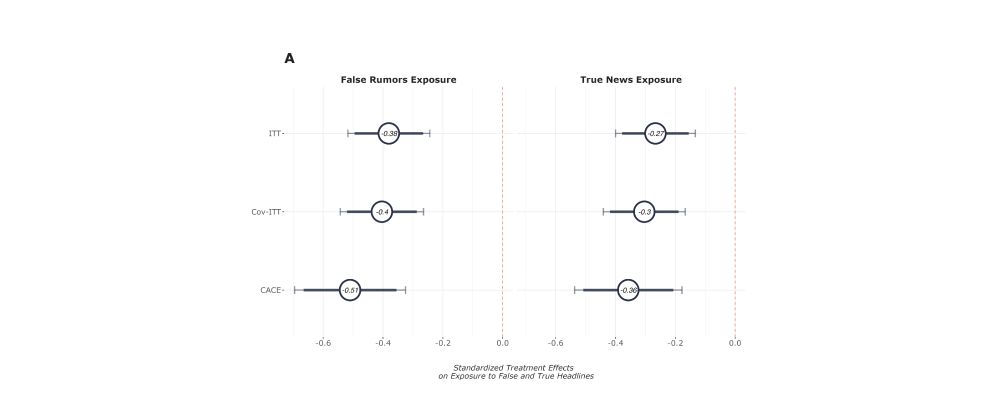
Treatment effects of WhatsApp Multimedia Deactivation on self-reported exposure to false rumors and true news stories.
Overall, the recall of misinformation dropped sharply.
Participants were 40% less likely to remember false headlines, a significantly larger reduction than the decline in recall of true news.
17.07.2025 14:51 — 👍 2 🔁 0 💬 1 📌 0
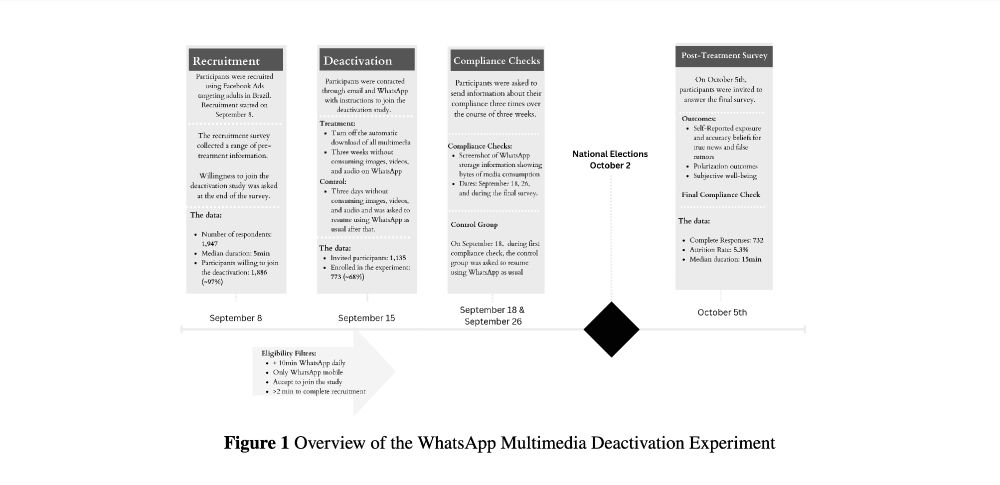
Overview of the WhatsApp Multimedia Deactivation Experiment
Our design recruited 773 WhatsApp users before the 2022 election. The treatment group (N≈400) turned off all auto-downloads (videos, images, audio, & docs) for 3 weeks, while the control group kept their usual settings. We also verified compliance weekly via storage screenshots.
17.07.2025 14:51 — 👍 1 🔁 0 💬 1 📌 0
We extend a well-known method for measuring social media’s causal effects in two directions:
1. Applying it to WhatsApp (not a feed-based platform).
2. Focusing on multimedia—the modal format of misinformation spread on WhatsApp.
17.07.2025 14:51 — 👍 1 🔁 0 💬 1 📌 0
What makes WhatsApp unique?
Despite no news feed, millions of Brazilians use it as a key source of political information.
But it's also where they see the most misinformation, primarily via viral videos/images & group chats.
So we designed a deactivation experiment for this landscape.
17.07.2025 14:51 — 👍 1 🔁 0 💬 1 📌 0
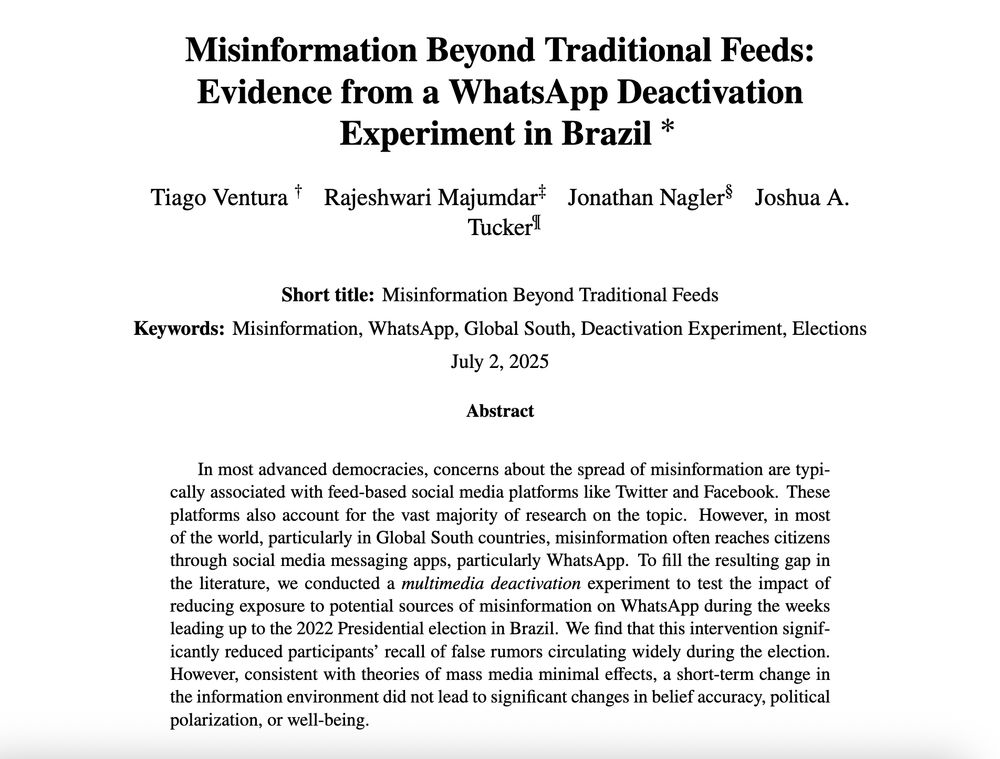
Abstract: In most advanced democracies, concerns about the spread of misinformation are typically associated with feed-based social media platforms like Twitter and Facebook. These platforms also account for the vast majority of research on the topic. However, in most of the world, particularly in Global South countries, misinformation often reaches citizens through social media messaging apps, particularly WhatsApp. To fill the resulting gap in the literature, we conducted a multimedia deactivation experiment to test the impact of reducing exposure to potential sources of misinformation on WhatsApp during the weeks leading up to the 2022 Presidential election in Brazil. We find that this intervention significantly reduced participants’ recall of false rumors circulating widely during the election. However, consistent with theories of mass media minimal effects, a short-term change in the information environment did not lead to significant changes in belief accuracy, political polarization, or well-being.
In the Global South, WhatsApp is more popular than X or Facebook.
New in @The_JOP, we ran a WhatsApp deactivation experiment during Brazil’s 2022 election to explore how the app facilitates the spread of misinformation and affects voters’ attitudes.
www.journals.uchicago.edu/doi/abs/10.1...
17.07.2025 14:51 — 👍 31 🔁 14 💬 1 📌 4
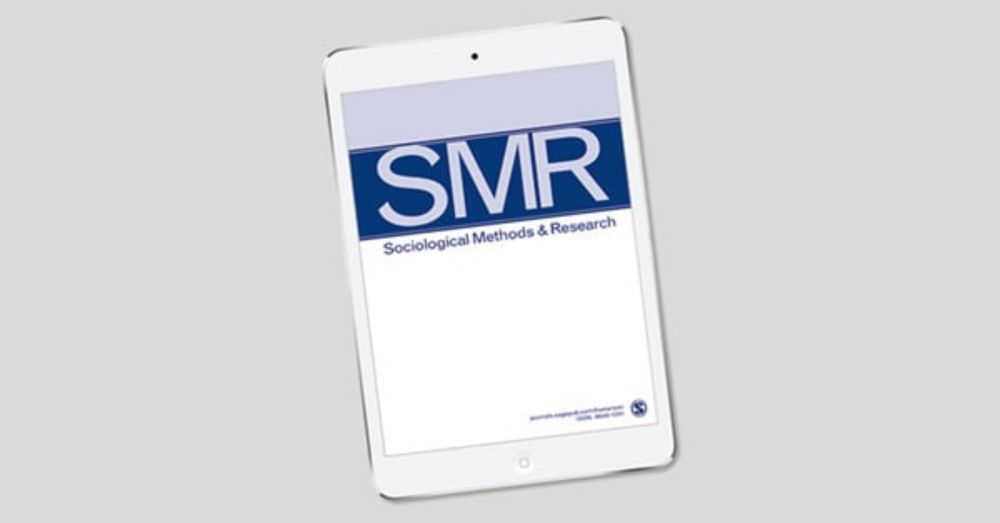
Quantifying Narrative Similarity Across Languages - Hannah Waight, Solomon Messing, Anton Shirikov, Margaret E. Roberts, Jonathan Nagler, Jason Greenfield, Megan A. Brown, Kevin Aslett, Joshua A. Tuck...
How can one understand the spread of ideas across text data? This is a key measurement problem in sociological inquiry, from the study of how interest groups sh...
I am thrilled to share a new article in Sociological Methods & Research, “Quantifying Narrative Similarity Across Languages”. My co-first author Sol Messing and our collaborators developed a new approach to measuring “narrative similarity” between texts: journals.sagepub.com/doi/10.1177/...
18.06.2025 15:56 — 👍 57 🔁 29 💬 3 📌 4
🚨New Publication @thejop.bsky.social We study who sets the issue agenda of state policymakers in the US. We find a mixed picture: they respond to shifts in attention by members of Congress, but also to the constituents in their states, particularly their own party supporters.
23.04.2025 10:00 — 👍 8 🔁 3 💬 7 📌 0
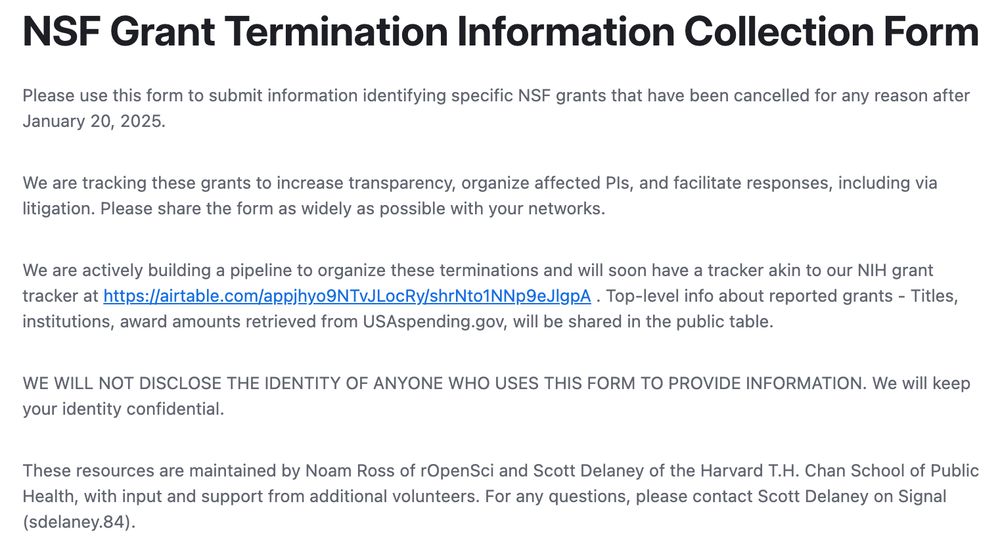
If your NSF grant has been terminated, please, please report it here:
airtable.com/appGKlSVeXni...
Collecting this information is supremely helpful to organize and facilitate a response.
21.04.2025 19:59 — 👍 6 🔁 5 💬 1 📌 0
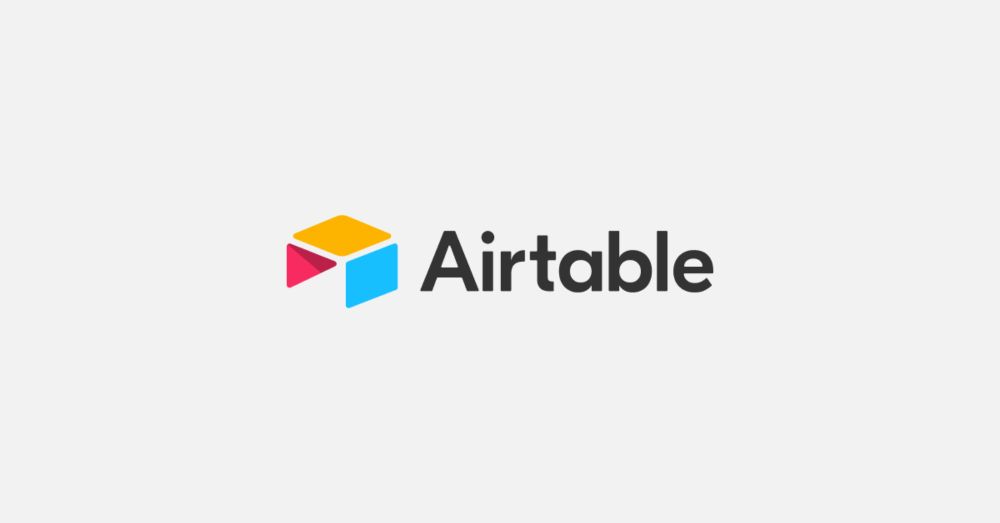
Airtable | Everyone's app platform
Airtable is a low-code platform for building collaborative apps. Customize your workflow, collaborate, and achieve ambitious outcomes. Get started for free.
🚨 NEW: Crowdsourced database of #NSF grant terminations. 🚨
We've been able to collect info on >110 cancelled grants that were cancelled on Friday. Thanks to all the researchers who reported over the holiday weekend. 🧪 airtable.com/appGKlSVeXni...
21.04.2025 19:57 — 👍 83 🔁 72 💬 4 📌 5
New paper out in @thejop.bsky.social with my colleagues at @csmapnyu.org . Substantive findings are summarized in the thread below.
Of interest to a broader sociological audience: we show how to measure discursive influence between different groups.
22.04.2025 10:27 — 👍 9 🔁 1 💬 0 📌 0
University of Chicago Press Journals: Cookie absent
Congrats to the authors @andreucasas.bsky.social, @oms279.bsky.social, @jpayson.bsky.social, @jatucker.bsky.social, Richard Bonneau, & Jonathan Nagler. The paper, which is accepted for publication at @thejop.bsky.social, is available here: www.journals.uchicago.edu/doi/10.1086/...
21.04.2025 19:12 — 👍 4 🔁 3 💬 1 📌 0
The research also indicates that state-level media, despite decreasing in number and quality in recent years, continues to play an important democratic function.
21.04.2025 19:12 — 👍 0 🔁 0 💬 1 📌 0
These findings have important implications for citizens seeking to influence state policy, suggesting that engaged constituents who follow politics closely can successfully drive attention to the issues they care about.
21.04.2025 19:12 — 👍 0 🔁 0 💬 1 📌 0
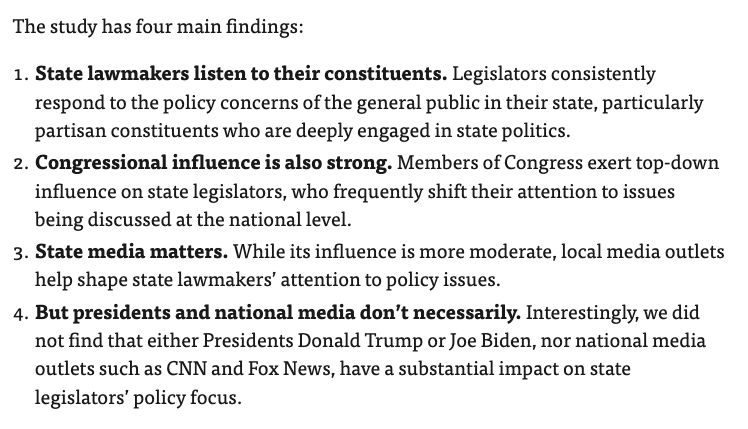
1) State lawmakers listen to their constituents. Legislators consistently respond to the policy concerns of the general public in their state, particularly partisan constituents who are deeply engaged in state politics.
2) Congressional influence is also strong. Members of Congress exert top-down influence on state legislators, who frequently shift their attention to issues being discussed at the national level.
3) State media matters. While its influence is more moderate, local media outlets help shape state lawmakers’ attention to policy issues.
4) But presidents and national media don’t necessarily. Interestingly, we did not find that either Presidents Donald Trump or Joe Biden, nor national media outlets such as CNN and Fox News, have a substantial impact on state legislators’ policy focus.
Overall, our findings challenge the narrative that state politics has become entirely nationalized. While national influence is certainly present, local voices still significantly shape state policy agendas.
Here's a summary of our four main findings:
21.04.2025 19:12 — 👍 2 🔁 1 💬 1 📌 0
To investigate, we collected 122m tweets from state & national lawmakers, local & national media outlets, and the general public in multiple states. We trained a new AI classification tool to analyze topics & track issue attention patterns. We gathered data from two distinct periods (2018 and 2021).
21.04.2025 19:12 — 👍 0 🔁 0 💬 1 📌 0
The study examines two broad (& not mutually exclusive) explanations for how state lawmakers prioritize issues:
1) Since state govt is closer to the ppl, legislators should be more responsive to local actors
2) Since politics is nationalized, lawmakers may align focus with national policy debates
21.04.2025 19:12 — 👍 0 🔁 0 💬 1 📌 0
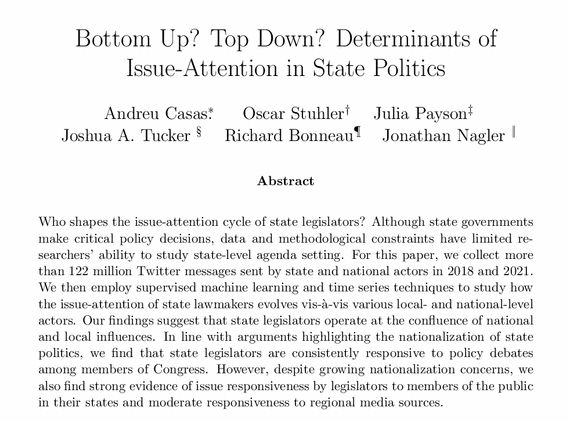
Title: Bottom Up? Top Down? Determinants ofIssue-Attention in State Politics
Abstract: Who shapes the issue-attention cycle of state legislators? Although state governments make critical policy decisions, data and methodological constraints have limited re-searchers’ ability to study state-level agenda setting. For this paper, we collect more than 122 million Twitter messages sent by state and national actors in 2018 and 2021.We then employ supervised machine learning and time series techniques to study how the issue-attention of state lawmakers evolves vis-`a-vis various local- and national-level actors. Our findings suggest that state legislators operate at the confluence of national and local influences. In line with arguments highlighting the nationalization of state politics, we find that state legislators are consistently responsive to policy debates among members of Congress. However, despite growing nationalization concerns, we also find strong evidence of issue responsiveness by legislators to members of the public in their states and moderate responsiveness to regional media sources.
Amid growing DC gridlock, state legislatures play a vital role in shaping policy. But how do state lawmakers decide which issues deserve their attention? Our new @thejop.bsky.social paper is the first large-scale multi-state analysis exploring this question
www.journals.uchicago.edu/doi/10.1086/...
21.04.2025 19:12 — 👍 14 🔁 4 💬 2 📌 2
![Text of email: Dear [redacted],
The U.S. National Science Foundation (NSF) has undertaken a review of its award portfolio. Each award was carefully and individually reviewed, and the agency has determined that termination of certain awards is necessary because they are not in alignment with current NSF priorities. Effective immediately, the following are terminated: [redacted]
NSF is issuing this termination to protect the interests of the government pursuant to NSF Grant General Conditions (GC-1) term and condition entitled Termination and Enforcement; on the basis that they no longer effectuate the program goals or agency priorities. This is the final agency decision and not subject to appeal. Costs incurred as a result of this termination may be reimbursed, provided such costs would otherwise be allowable under the terms of the award and the governing cost principles. In accordance with your award terms and conditions, you have 30 days from the termination date to furnish a summary of progress under the award and an itemized accounting of allowable costs incurred prior to the termination date.
Sincerely, [redacted] Division Director
Office of Budget Finance and Award Management (BFA)
Division of Grants and Agreements (DGA)](https://cdn.bsky.app/img/feed_thumbnail/plain/did:plc:l3jbgdl7a5rtsfyrgjw7spkz/bafkreif3rmsl6htpibxg3loqsuazljaekd636abaavvfm4nkjplr5e6itu@jpeg)
Text of email: Dear [redacted],
The U.S. National Science Foundation (NSF) has undertaken a review of its award portfolio. Each award was carefully and individually reviewed, and the agency has determined that termination of certain awards is necessary because they are not in alignment with current NSF priorities. Effective immediately, the following are terminated: [redacted]
NSF is issuing this termination to protect the interests of the government pursuant to NSF Grant General Conditions (GC-1) term and condition entitled Termination and Enforcement; on the basis that they no longer effectuate the program goals or agency priorities. This is the final agency decision and not subject to appeal. Costs incurred as a result of this termination may be reimbursed, provided such costs would otherwise be allowable under the terms of the award and the governing cost principles. In accordance with your award terms and conditions, you have 30 days from the termination date to furnish a summary of progress under the award and an itemized accounting of allowable costs incurred prior to the termination date.
Sincerely, [redacted] Division Director
Office of Budget Finance and Award Management (BFA)
Division of Grants and Agreements (DGA)
Here's a copy of an NSF grant termination notice that went out today. "NSF is issuing this termination to protect the interests of the government pursuant...on the basis that they no longer effectuate the program goals or agency priorities." Not subject to appeal. #HigherEd #AcademicSky
18.04.2025 23:19 — 👍 108 🔁 64 💬 7 📌 11
I'm an associate director at the Pew Research Center in Washington, DC. Follow us: @pewresearch.org. Learn more: https://www.pewresearch.org/
Washington Post, formerly Vanity Fair, WSJ. Author of War@WSJ. sarah(dot)ellison(at)washpost.com. Cell/Signal 917,400,1092
Host of Local News International
Subscribe for free: http://LNI.media
Support us: http://LNI.media/membership
New York Times intelligence reporter.
New York Times in California. Previously in Beijing, Moscow, Baghdad and DC. Author of "The New Tsar: The Rise and Reign of Vladimir Putin" http://bit.ly/3bbpinS
https://www.nytimes.com/by/steven-lee-myers
Research Director, Citizens and Technology Lab, Cornell University, r/AskHistorians moderator
I study how to make the internet freer and safer— and how to help the helpers on the ground making that possible. She/her
https://citizensandtech.org/
We're an independent, nonprofit newsroom covering New York. Read our newsletter: https://www.thecity.nyc/the-scoop/
We’re a research center at Harvard Kennedy School dedicated to studying the crisis in our information ecosystem and its impacts on society.
Professor, Fordham Law School; Sr. Policy Research Fellow, Knight First Amendment Institute. I teach, read, and write about information and communications law. https://papers.ssrn.com/sol3/cf_dev/AbsByAuth.cfm?per_id=1084259
Information Ecologist exploring the information environment | Senior Fellow at @carnegieendowment.org and Director of @ieproject.bsky.social | PhD from KCL War Studies | Visiting Researcher @uniofbath.bsky.social | Author of The Information Animal 🇨🇦
Dhavan is Jack M. McLeod Professor of Communication Research, Maier-Bascom Chair, and Director of the Mass Communication Research Center at the UW-Madison.
Co-Director, Liberty & NatSec @BrennanCenter
Palmer Chair in Law and Public Policy at Dalhousie Law. Formerly @ UCLA and Yale. All things tech and democracy. Dachshund enthusiast.
law prof currently on leave @ Institute for Advanced Study
Associate Dean for Research & Professor, Santa Clara Law. Internet Law, IP, Advertising Law. He/him. Website: http://www.ericgoldman.org. Email: egoldman@gmail.com
Asst Prof, University of Houston Law Center
Law, tech policy, survivor safety & privacy @nnedv.bsky.social. Advisory Committee, Cyber Civil Rights Initiative. Former AI & Tech @hrc.org. Vintage style, not vintage values. Views my own.
Human-centered researcher of emerging tech. Designer of alternative interactions. Research Fellow at @CenDemTech. Ph.D. in HCI from @CarnegieMellon
Prof @ Northwestern law, political theorist, cat parent. Black lives matter.
Profile, pubs, etc: https://gowder.io
All my books (rule of law, racial justice, platform governance) are downloadable in free open access pdf @ https://books.gowder.io
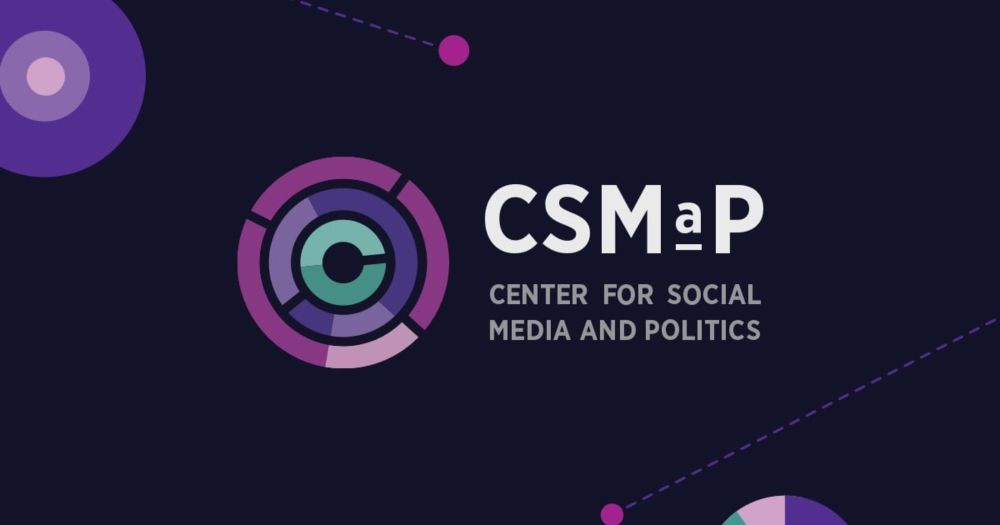









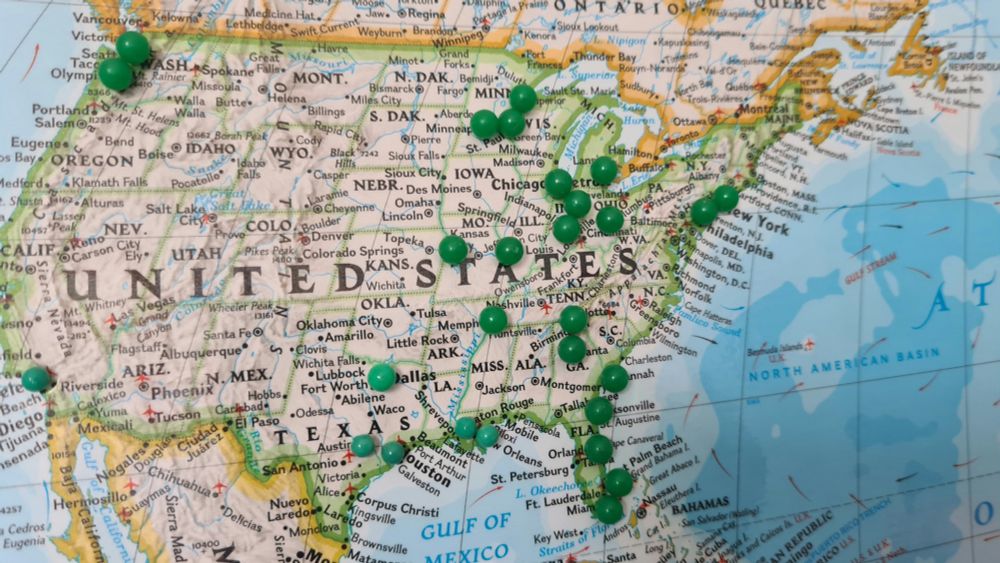


![Text of email: Dear [redacted],
The U.S. National Science Foundation (NSF) has undertaken a review of its award portfolio. Each award was carefully and individually reviewed, and the agency has determined that termination of certain awards is necessary because they are not in alignment with current NSF priorities. Effective immediately, the following are terminated: [redacted]
NSF is issuing this termination to protect the interests of the government pursuant to NSF Grant General Conditions (GC-1) term and condition entitled Termination and Enforcement; on the basis that they no longer effectuate the program goals or agency priorities. This is the final agency decision and not subject to appeal. Costs incurred as a result of this termination may be reimbursed, provided such costs would otherwise be allowable under the terms of the award and the governing cost principles. In accordance with your award terms and conditions, you have 30 days from the termination date to furnish a summary of progress under the award and an itemized accounting of allowable costs incurred prior to the termination date.
Sincerely, [redacted] Division Director
Office of Budget Finance and Award Management (BFA)
Division of Grants and Agreements (DGA)](https://cdn.bsky.app/img/feed_thumbnail/plain/did:plc:l3jbgdl7a5rtsfyrgjw7spkz/bafkreif3rmsl6htpibxg3loqsuazljaekd636abaavvfm4nkjplr5e6itu@jpeg)